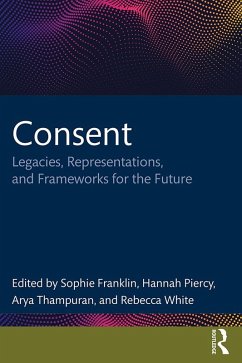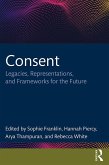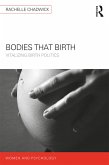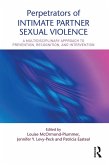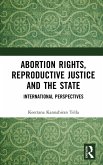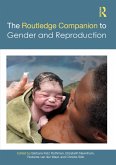Consent (eBook, PDF)
Legacies, Representations, and Frameworks for the Future
Redaktion: Franklin, Sophie; White, Rebecca; Thampuran, Arya; Piercy, Hannah
44,95 €
44,95 €
inkl. MwSt.
Sofort per Download lieferbar

22 °P sammeln
44,95 €
Als Download kaufen

44,95 €
inkl. MwSt.
Sofort per Download lieferbar

22 °P sammeln
Jetzt verschenken
Alle Infos zum eBook verschenken
44,95 €
inkl. MwSt.
Sofort per Download lieferbar
Alle Infos zum eBook verschenken

22 °P sammeln
Consent (eBook, PDF)
Legacies, Representations, and Frameworks for the Future
Redaktion: Franklin, Sophie; White, Rebecca; Thampuran, Arya; Piercy, Hannah
- Format: PDF
- Merkliste
- Auf die Merkliste
- Bewerten Bewerten
- Teilen
- Produkt teilen
- Produkterinnerung
- Produkterinnerung

Bitte loggen Sie sich zunächst in Ihr Kundenkonto ein oder registrieren Sie sich bei
bücher.de, um das eBook-Abo tolino select nutzen zu können.
Hier können Sie sich einloggen
Hier können Sie sich einloggen
Sie sind bereits eingeloggt. Klicken Sie auf 2. tolino select Abo, um fortzufahren.

Bitte loggen Sie sich zunächst in Ihr Kundenkonto ein oder registrieren Sie sich bei bücher.de, um das eBook-Abo tolino select nutzen zu können.
Consent: Legacies, Representations, and Frameworks for the Future examines 'consent' across various historical periods, cultures, and disciplines to offer an expansive, pluralistic vision for future articulations of consent as it circulates throughout contemporary life in sexual encounters, medical contexts, and media representations.
- Geräte: PC
- mit Kopierschutz
- eBook Hilfe
Andere Kunden interessierten sich auch für
![Consent (eBook, ePUB) Consent (eBook, ePUB)]() Consent (eBook, ePUB)44,95 €
Consent (eBook, ePUB)44,95 €![Bodies that Birth (eBook, PDF) Bodies that Birth (eBook, PDF)]() Rachelle ChadwickBodies that Birth (eBook, PDF)46,95 €
Rachelle ChadwickBodies that Birth (eBook, PDF)46,95 €![Perpetrators of Intimate Partner Sexual Violence (eBook, PDF) Perpetrators of Intimate Partner Sexual Violence (eBook, PDF)]() Perpetrators of Intimate Partner Sexual Violence (eBook, PDF)48,95 €
Perpetrators of Intimate Partner Sexual Violence (eBook, PDF)48,95 €![Reviving the Tribe (eBook, PDF) Reviving the Tribe (eBook, PDF)]() Eric RofesReviving the Tribe (eBook, PDF)46,95 €
Eric RofesReviving the Tribe (eBook, PDF)46,95 €![Abortion Rights, Reproductive Justice and the State (eBook, PDF) Abortion Rights, Reproductive Justice and the State (eBook, PDF)]() Keertana Kannabiran TellaAbortion Rights, Reproductive Justice and the State (eBook, PDF)41,95 €
Keertana Kannabiran TellaAbortion Rights, Reproductive Justice and the State (eBook, PDF)41,95 €![The Routledge Companion to Gender and Reproduction (eBook, PDF) The Routledge Companion to Gender and Reproduction (eBook, PDF)]() The Routledge Companion to Gender and Reproduction (eBook, PDF)45,95 €
The Routledge Companion to Gender and Reproduction (eBook, PDF)45,95 €![Male Prostitution (eBook, PDF) Male Prostitution (eBook, PDF)]() Donald West JMale Prostitution (eBook, PDF)45,95 €
Donald West JMale Prostitution (eBook, PDF)45,95 €-
-
-
Consent: Legacies, Representations, and Frameworks for the Future examines 'consent' across various historical periods, cultures, and disciplines to offer an expansive, pluralistic vision for future articulations of consent as it circulates throughout contemporary life in sexual encounters, medical contexts, and media representations.
Dieser Download kann aus rechtlichen Gründen nur mit Rechnungsadresse in A, B, BG, CY, CZ, D, DK, EW, E, FIN, F, GR, HR, H, IRL, I, LT, L, LR, M, NL, PL, P, R, S, SLO, SK ausgeliefert werden.
Produktdetails
- Produktdetails
- Verlag: Taylor & Francis eBooks
- Seitenzahl: 262
- Erscheinungstermin: 10. November 2023
- Englisch
- ISBN-13: 9781003815204
- Artikelnr.: 69256372
- Verlag: Taylor & Francis eBooks
- Seitenzahl: 262
- Erscheinungstermin: 10. November 2023
- Englisch
- ISBN-13: 9781003815204
- Artikelnr.: 69256372
- Herstellerkennzeichnung Die Herstellerinformationen sind derzeit nicht verfügbar.
Sophie Franklin is a postdoctoral researcher in English literature at the Ludwig-Maximilian University of Munich, Germany. She specialises in nineteenth-century literature, cultural legacies, and representations of violence from the late eighteenth century to the present. Hannah Piercy is a postdoctoral researcher and assistant in Medieval English Studies at the University of Bern, Switzerland. She works on medieval insular romance, consent and coercion, and sensory studies. Arya Thampuran is Assistant Professor at Durham University's Institute for Medical Humanities, UK, and the Principal Investigator on the Black Health and the Humanities Network. Her research engages with how creative practitioners across the African diaspora express mental health and healing through non-biomedical modes. Rebecca White teaches in the Department of English Studies at Durham University, UK, where she completed an AHRC-funded doctorate on screen adaptations of nineteenth-century fiction.
Table of Contents; List of Contributors; Acknowledgements; 1. Introduction; PART I: Culture and Resistance 2. Could Briseis Consent? A Critical Comparison of Contemporary Women Writers' Adaptations of Briseis's Narrative 3. Stopping the Rapist in our Path: Resisting Rape Culture in Latin American Music and Performance Art 4. Mera Jism, Meri Marzi: Crisis of Consent and Digital Mediations in Pakistan 5. Do to Me What I Could Never Ask of You: Consensual Non-Consent in BDSM and the Limits of Affirmative Consent; PART II: Consent on Stage and Screen 6.'You Have No Right to Do What You Like with Me': Rape, Sexual Abuse, and Consent in African American Enslavement and its Afterlives 7. Without Consent or Memory: Consent in Michaela Coel's I May Destroy You 8. Beyond 'Yes, and...': Consent in the Theatre Arts Curriculum, On-stage and Off; PART III: Lived Experience and (Authorial) Expressions 9. Re-establishing Identity through Testimony: The Rape Survival Narratives of Mary Hays's The Victim of Prejudice (1799) and Mary Wollstonecraft's Maria, or The Wrongs of Woman (1798) 10. 'A Skin of One's Own': Decolonising Traumatic Testimony and the Poetics of Wholeness 11. 'I wasn't aware at the time, I could actually say "no"': Intimacy, Expectations, and Consent in Queer Relationships; PART IV: Futures of Consent 12. Troubling Technologies for Sexual Consent 13. Sexual Offences and Defined Consent: Lessons from the Past and a Framework for the Future 14. Op-eds and Fashion Shows: The History and Future of Consent Education in Ireland 15. Consent Wars? Towards a Critical-Governmentality Approach to Consent in Post-Roe America 16. Afterword; Index
Table of Contents; List of Contributors; Acknowledgements; 1. Introduction; PART I: Culture and Resistance 2. Could Briseis Consent? A Critical Comparison of Contemporary Women Writers' Adaptations of Briseis's Narrative 3. Stopping the Rapist in our Path: Resisting Rape Culture in Latin American Music and Performance Art 4. Mera Jism, Meri Marzi: Crisis of Consent and Digital Mediations in Pakistan 5. Do to Me What I Could Never Ask of You: Consensual Non-Consent in BDSM and the Limits of Affirmative Consent; PART II: Consent on Stage and Screen 6.'You Have No Right to Do What You Like with Me': Rape, Sexual Abuse, and Consent in African American Enslavement and its Afterlives 7. Without Consent or Memory: Consent in Michaela Coel's I May Destroy You 8. Beyond 'Yes, and...': Consent in the Theatre Arts Curriculum, On-stage and Off; PART III: Lived Experience and (Authorial) Expressions 9. Re-establishing Identity through Testimony: The Rape Survival Narratives of Mary Hays's The Victim of Prejudice (1799) and Mary Wollstonecraft's Maria, or The Wrongs of Woman (1798) 10. 'A Skin of One's Own': Decolonising Traumatic Testimony and the Poetics of Wholeness 11. 'I wasn't aware at the time, I could actually say "no"': Intimacy, Expectations, and Consent in Queer Relationships; PART IV: Futures of Consent 12. Troubling Technologies for Sexual Consent 13. Sexual Offences and Defined Consent: Lessons from the Past and a Framework for the Future 14. Op-eds and Fashion Shows: The History and Future of Consent Education in Ireland 15. Consent Wars? Towards a Critical-Governmentality Approach to Consent in Post-Roe America 16. Afterword; Index
